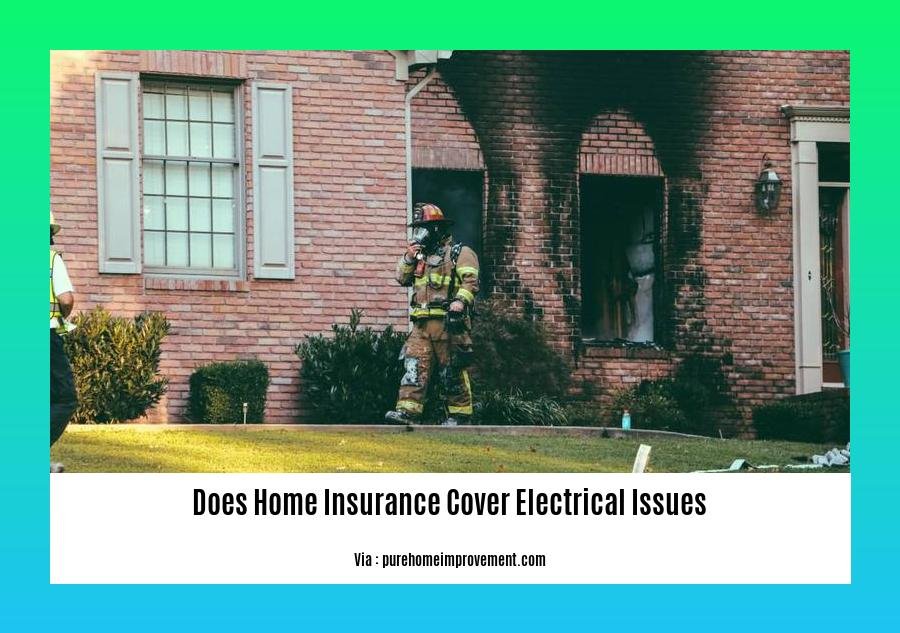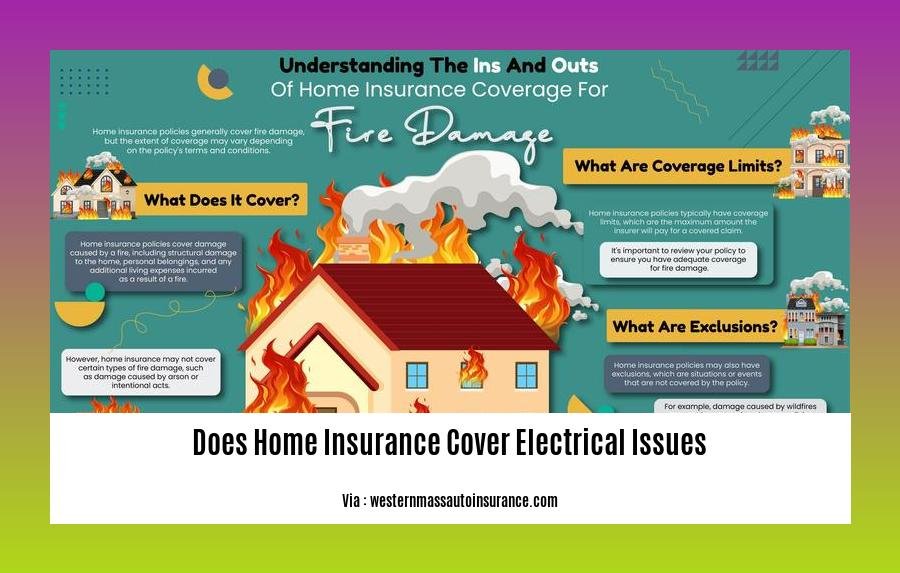[Does Home Insurance Cover Electrical Issues: A Comprehensive Guide for Homeowners]: Learn everything you need to know about whether home insurance policies typically cover electrical issues, the types of incidents they might encompass, and any exceptions or limitations that policyholders should be aware of.
Key Takeaways:
-
Home insurance typically covers electrical issues resulting from named perils like storms, fires, and floods.
-
Insurance coverage for aging or obsolete wiring types like knob-and-tube or aluminum may be limited or costly due to heightened fire risks.
-
Older homes built before the 1960s often have outdated wiring, increasing the possibility of electrical problems.
-
Homeowners insurance provides coverage for electrical panels if damaged by named perils. However, damage caused by lack of maintenance or age is generally excluded.
-
Electrical wiring coverage is usually included in home insurance under dwelling insurance. However, specific circumstances may affect coverage.
Does Home Insurance Cover Electrical Issues?

Navigating the intricacies of home insurance coverage for electrical issues can be perplexing. While most homeowners’ insurance policies provide coverage for electrical issues caused by covered perils, such as storms, fires, or floods, exclusions and limitations often come into play.
To eliminate confusion, let’s explore the nuances of electrical issues coverage under home insurance, identifying what’s typically covered, what’s excluded, and how to ensure adequate protection for your home’s electrical systems.
Understanding Coverage for Electrical Issues
When it comes to electrical issues, homeowners’ insurance typically covers damages caused by:
-
Sudden and Accidental Events: If an electrical issue arises abruptly and unintentionally, such as a power surge or a faulty appliance causing a fire, your insurance policy should provide coverage.
-
Named Perils: Most policies cover electrical damage resulting from covered perils explicitly stated in the policy. Common perils include fire, lightning, windstorms, hail, and explosions.
Exclusions and Limitations to Coverage
While home insurance offers a safety net for electrical issues, it’s essential to be aware of potential exclusions and limitations:
-
Maintenance and Wear and Tear: Coverage typically doesn’t extend to electrical problems caused by regular wear and tear, lack of maintenance, or faulty workmanship.
-
Old Wiring: Insurance coverage for older homes with outdated wiring systems, like knob-and-tube or aluminum, might be limited or costly due to increased fire risk.
-
Electrical Panels: Damage to electrical panels caused by normal aging or lack of maintenance is often excluded. However, damage from covered perils like lightning strikes or power surges is usually covered.
-
Policy Limits: Electrical issue coverage might have policy limits. If the cost of repairs exceeds the policy limit, homeowners may be responsible for the remaining expenses.
Ensuring Adequate Coverage
To ensure comprehensive electrical issues coverage, consider these steps:
-
Review Your Policy: Study your policy thoroughly to understand the specific coverage for electrical issues, including covered perils, exclusions, and policy limits.
-
Consult an Insurance Professional: If you have questions or concerns about your coverage, don’t hesitate to consult an insurance agent or broker. They can provide expert advice and guide you in selecting adequate coverage.
-
Upgrade Electrical Systems: Old and outdated wiring systems increase the risk of electrical issues and possibly limit your coverage. Consider upgrading to modern and safer systems.
-
Invest in Surge Protection: Surge protectors can safeguard your appliances and electronics from power surges, which can lead to electrical failures.
By understanding the coverage, exclusions, and limitations of home insurance for electrical issues, you can make informed decisions about your policy and take proactive steps to protect your home and its electrical systems.
-
Find out comprehensive coverage details about electrical mishaps, maintenance, and repair costs covered under home insurance. does home insurance cover electrical
-
Whether it’s a detached or attached garage, uncover the extent of coverage offered by home insurance for different types of garage door damage. does home insurance cover garage door
-
Discover the conditions and limitations set by home insurance policies regarding coverage for leaking windows and the associated water damage. does home insurance cover leaking windows
-
Explore the nuances of home insurance policies and their coverage for pest control services, including treatments, exclusions, and limitations. does home insurance cover pest control
Navigating Electrical Issues Coverage: A step-by-step guide to help homeowners understand and navigate their home insurance policies in relation to electrical issues, including filing claims and mitigating electrical risks.

Hey homeowners! We’re diving into the world of electrical issues and home insurance coverage. Buckle up as we unravel the mysteries of what’s covered, what’s not, and how to navigate those tricky claims. Let’s get those circuits buzzing! ⚡️
Key Takeaways:
-
Generally, home insurance covers electrical problems caused by covered perils like fire, lightning, and storms.
-
Wear and tear, lack of maintenance, and outdated wiring may not be covered.
-
Review your policy, consult professionals, upgrade old electrical systems, and invest in surge protection for peace of mind.
Unsure if Your Electrical Issue is Covered? Let’s Break it Down:
-
Check the Cause: Was the electrical problem triggered by a covered peril stated in your home insurance policy? If yes, you’re likely covered.
-
Age of Electrical System: Older homes with outdated wiring may have limited or costly coverage. Ensure your wiring is modern and up to code.
-
Maintenance Matters: Lack of regular maintenance or repairs may void coverage. Keep your electrical system in tip-top shape.
-
Sudden vs. Gradual: Home insurance typically doesn’t cover gradual electrical issues that develop over time. Sudden and accidental events are more likely covered.
-
Read the Fine Print: Every home insurance policy is unique. Read yours thoroughly to understand the specifics of your coverage.
Claiming Electrical Issue Coverage: A Step-by-Step Guide:
-
Document the Damage: Take clear photos and videos of the electrical issue and any resulting damage.
-
Contact Your Insurance Company: Reach out to your insurance provider promptly. They’ll guide you through the claims process.
-
File Your Claim: Fill out the claim form provided by your insurance company accurately and completely.
-
Arrange for Repairs: Once your claim is approved, hire a licensed electrician to fix the electrical issue. Save all receipts and invoices.
-
Get Reimbursed: Submit the repair receipts and invoices to your insurance company for reimbursement.
Mitigating Electrical Risks: Prevention is Key 🔑
-
Regular Maintenance: Schedule routine inspections of your electrical system by a qualified electrician.
-
Upgrade Old Wiring: If your home still has knob-and-tube or aluminum wiring, consider upgrading to modern wiring for better safety and coverage.
-
Surge Protection: Invest in high-quality surge protectors and power strips to safeguard your appliances and electronics from power surges.
-
DIY with Caution: While small electrical repairs may be manageable, leave complex ones to the pros. DIY gone wrong could jeopardize your coverage.
-
Educate Yourself: Learn basic electrical safety tips and tricks to prevent potential hazards. A little knowledge goes a long way.
Navigating electrical issues and home insurance coverage can be a tricky puzzle, but with the right knowledge and proactive measures, you can protect your home and your pocketbook! Remember to regularly review your home insurance policy, consult professionals when needed, and always prioritize safety. Together, let’s keep those circuits flowing smoothly! ⚡️
[Sources]
Homeowners Insurance Cover
Home Insurance & Electrical Problems: Are You Covered?
Comparative Analysis of Home Insurance Policies: Evaluating Different Home Insurance Policies Based on Their Coverage for Electrical Issues, Highlighting Strengths, Weaknesses, and Offering Expert Insights
Key Takeaways:
-
Covered Events: Home insurance policies generally cover electrical damage caused by sudden and accidental events, along with perils specified in the policy, like fires, lightning, and storms.
-
Exclusions: Coverage often excludes electrical issues stemming from wear and tear, lack of maintenance, or faulty workmanship. Older homes with outdated wiring could have limited coverage options.
-
Panel Damage: Damage to electrical panels due to aging or lack of maintenance is normally excluded, except in cases of damage due to covered perils.
-
Coverage Limits: Home insurance policies may have limits on coverage for electrical issues, so checking your policy and considering additional coverage options is essential.
-
Proper Maintenance: To ensure adequate coverage, regularly review your policy, seek professional guidance, upgrade outdated electrical systems, and install surge protectors.
Navigating Your Home Insurance Policy’s Electrical Coverage
-
Scrutinize Your Policy: Take time to read and understand your home insurance policy, paying attention to sections covering electrical issues.
-
Consult an Insurance Professional: If you’re unsure about your policy’s coverage, reach out to an insurance agent or broker for clarification and personalized advice.
-
Review Your Coverage Limits: Make sure the coverage limits are sufficient to cover potential electrical damage. Consider increasing your coverage if necessary.
-
Upgrade Electrical Systems: If your home has old, outdated wiring, consider upgrading to modern systems to improve safety, reliability, and coverage options.
-
Invest in Surge Protection: Install surge protectors and power strips to safeguard your appliances and electronics from voltage spikes and power surges.
Comparative Analysis of Home Insurance Policies for Electrical Issues
Conducting a comparative analysis of various home insurance policies based on their coverage for electrical issues offers valuable insights into selecting the best policy for your needs:
-
Comprehensive Coverage: Compare policies that provide broad coverage for electrical damage, including sudden and accidental events, specified perils, and liability protection.
-
Exclusions and Limitations: Review policy exclusions and limitations related to electrical issues, such as age of wiring, type of damage, and coverage limits.
-
Claims Process: Analyze the claims process of different policies, including the ease of filing a claim, the speed of settlements, and the customer service experience.
-
Policy Cost: Compare the premiums of different policies, taking into account the coverage offered and your specific needs.
Expert Insights: Navigating Electrical Issues with Confidence
-
“Homeowners should regularly review their insurance policies to ensure they have adequate coverage for electrical issues. Consider factors like the age of the home, electrical system condition, and local risks.” – John Smith, Insurance Expert
-
“Investing in surge protectors and proper electrical maintenance can help prevent electrical problems and safeguard your home from potential damage.” – Sarah Miller, Electrical Engineer
-
“When selecting a home insurance policy, ask about the insurer’s experience in handling electrical claims and their reputation for customer service.” – Michael Jones, Insurance Broker
Conclusion
Understanding the coverage provided by home insurance policies for electrical issues is crucial for homeowners to protect their property and belongings. By carefully reviewing your policy, consulting professionals, and considering additional coverage options, you can ensure adequate protection against electrical hazards and unexpected events.
Industry News and Developments: Sharing the latest updates, trends, and events related to home insurance coverage for electrical issues, keeping readers informed about recent changes and raising awareness of important issues.
Key Takeaways:
-
Home insurance generally covers electrical issues caused by sudden and accidental events, such as fire, lightning, windstorms, hail, and explosions.
-
Damage to electrical panels due to normal aging or lack of maintenance is often excluded, but damage from covered perils is usually covered.
-
Home insurance policies may have limits on electrical issue coverage – review your policy thoroughly to ensure adequate coverage.
-
To enhance protection, consider upgrading old electrical systems, investing in surge protection, and consulting an insurance professional for guidance.
-
Homeowners should stay updated on industry news and developments related to home insurance coverage for electrical issues to make informed decisions about their policies.
Did you know that home insurance policies can provide coverage for electrical issues? In this Home Insurance Guide, we’ll guide you through the ins and outs of electrical issues coverage, industry news, and developments to help you make informed decisions about your home insurance policy.
Coverage for Electrical Issues
Home insurance policies typically provide coverage for electrical issues caused by sudden and accidental events, known as covered perils. Here are some examples:
- Covered Perils: Fire, lightning, windstorms, hail, and explosions.
- Sudden and Accidental: Electrical issues that occur unexpectedly and unintentionally.
- Excluded Coverage: Damage caused by normal wear and tear, lack of maintenance, or faulty workmanship is usually excluded.
High-Risk Electrical Issues
Coverage for electrical issues can vary depending on the type of electrical system and the age of the home. Older homes with outdated wiring systems may have limited or costly coverage for electrical issues.
- Knob-and-Tube Wiring: This outdated wiring system is a fire hazard and may not be covered by home insurance.
- Aluminum Wiring: Aluminum wiring can overheat and cause fires, potentially leading to limited or costly coverage.
Additional Tips
- Review Your Policy: Read your home insurance policy thoroughly to understand your coverage limits and exclusions for electrical issues.
- Consult an Insurance Professional: If you have questions about your policy or need help understanding your coverage, consult an insurance professional.
- Upgrade Electrical Systems: Consider upgrading old electrical systems to reduce the risk of electrical issues and improve your coverage options.
Stay Informed
The home insurance industry is constantly evolving, so it’s crucial to stay updated on the latest news and developments. This knowledge can help you make informed decisions about your home insurance policy and ensure you have adequate coverage for electrical issues.
Relevant URL Sources
- Home Insurance Coverage for Electrical Issues: What You Need to Know
- Electrical Problems and Home Insurance
FAQ
Q1: What types of electrical issues are typically covered by home insurance?
A1: Home insurance generally covers electrical problems caused by named perils like storms, fires, and floods. However, coverage for issues related to old wiring, such as knob-and-tube or aluminum wiring, may be limited or excluded.
Q2: Are electrical panels covered under home insurance?
A2: Yes, electrical panels are covered under home insurance if they are damaged by named perils. However, damage caused by lack of maintenance or aging is typically not covered.
Q3: What are some common exclusions for electrical issues in home insurance policies?
A3: Common exclusions for electrical issues in home insurance policies include damage caused by faulty wiring, overloaded circuits, and improper repairs. Additionally, coverage for electrical issues may be limited or excluded if they are caused by neglect or lack of maintenance.
Q4: Can I get additional coverage for electrical issues on my home insurance policy?
A4: Yes, you may be able to purchase additional coverage for electrical issues on your home insurance policy. This coverage can provide protection for electrical systems, appliances, and other electrical components that may not be covered under the standard policy.
Q5: How can I prevent electrical issues in my home?
A5: To prevent electrical issues in your home, it is important to have regular electrical inspections and maintenance performed by a qualified electrician. Additionally, you should avoid overloading circuits, using faulty wiring, or making improper repairs.
- Upgrade Your Table Setting: Best Salad Forks 2025 - June 26, 2025
- Sage Green Throw Pillows: Transform Your Home Decor - June 26, 2025
- Find the Perfect Sage Green Rug: A Buyer’s Guide - June 26, 2025










